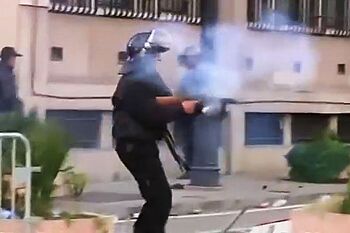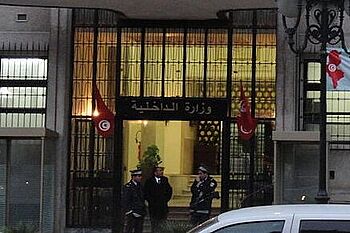For many persecuted people, the back entrance to the Tunisian Ministry of the Interior was a doorway to hell. Often, after passing through this gate, they were severely tortured and held in prison for many years. The Commission for Truth and Dignity, which spent five years investigating human rights violations in Tunisia, conducted nearly 50,000 hearings. The final report of 2019 accuses former President Béji Caïd Essebsi of being part of the “system of tyranny.”
“They force you to confess imaginary things”

Security forces take action against demonstrators in front of the Tunisian Ministry of the Interior in January 2011. Four years earlier, Béchir Mesbahi had been severely tortured in the building. At the age of 19, he was arrested in the city of Sousse and taken to Tunis. In the Ministry of the Interior he was forced to sit on a chair in a corridor for 32 days. In a French documentary he describes how he was tortured there.
“Before my arrest I had a traffic accident in which I suffered a head injury that required me to have three operations on my right hand. In spite of this, I was confronted with various methods of torture: beatings, electric shocks and hanging from the ceiling, in the position of a ‘grilled chicken’ (in French: ‘poulet rôti`’). The director of the State Security put a gun in my mouth and threatened to kill me if I refused to help them. […]
A doctor attended to us daily to reduce any signs of torture. He massaged my feet and legs to remove the traces of the torment I suffered... I also heard Mokhles Ammar screaming at full strength under the torture. It was he who had spoken my name, but when I saw him, I did not recognize him, his face was so deformed. The torturers force you to confess imaginary things that have nothing to do with reality... Even those who do not go to the mosque to pray have been arrested...
During the sessions, when I was hung from the ceiling, I lost consciousness several times. Then they took me down, sprayed me with water and swung me from right to left... They had an impressive number of officers available for interrogation and torture sessions. They placed a hood made of cloth fragments over us, ordered us to lower our eyes so that we wouldn’t see anything, and more importantly, wouldn’t remember the faces of the torturers.”
Source: Rapport sur la torture en Tunisie, p. 115f. (private translation)
Links
Reports from the Commission for Truth and Dignity (French)
Summary of the Truth Commission's final report by Human Rights Watch
Avocats Sans Frontières on the publication of the Truth Commission's final report
After the Dictatorship. Instruments of Transitional Justice in Former Authoritarian Systems – An International Comparison
A project at the Department of Modern History at the University of Würzburg
Twitter: @afterdictatorship
Instagram: After the dictatorship
With financial support from the German Federal Ministry for Economic Cooperation and Development
“They squeezed my testicles until I fainted”

Credit: OsamaK / CC BY-SA
The uniformed men stand around bored at the wide-open entrance to the Tunisian Ministry of the Interior. It is hard to imagine that people were brutally tortured behind these walls for decades. One of the victims was the then 25-year-old Zied Ben Jemaa. He was arrested in April 2005 and sentenced a year-and-a-half later by the criminal court in Tunis to twelve years in prison. In a French documentary, the active soccer player recalls the abuse he endured.
“I was arrested at home on April 18, 2005 at 01:30. I was held for 13 days in a secret place without my family or lawyer knowing where I was. There, in the rooms of the Ministry of the Interior, I suffered every possible and imaginable form of torture: I was hung from the ceiling with my hands and beaten on all parts of my body with batons and rubber sticks. The torturers mainly attacked my lower area below the abdomen. To this day I still have intense pain there, especially when I urinate. Despite my urgent pleas, I was never medically examined.
The torturer Adberrahmane Guesmi - nicknamed ‘Bokassa’ - and his team distinguished themselves in the manner in which they tortured me. They squeezed my testicles several times until I fainted and they burned my pubic hair. To force me to show them the house of Ezzeddine Abdellaoui, who was imprisoned regarding the same affair, the policemen took me to Carthage late at night and tortured me in the open street in front of the Café des Frères in a deserted neighborhood. ‘We'll use your head as a ball,’ they explained to me before throwing me to the ground, kicking my whole body, aiming mainly at my head.
My torturers used fake names – like ‘Zouheir’ or ‘Abdelmajid’. They are led by ‘Bokassa.’ On April 13, 2007, I filed a complaint with the Tunisian Public Prosecutor’s Office under number 7021177/2007 against my torturers and all those responsible for my abuse. But not a single action was taken in response to this complaint. This has led me to engage in a series of hunger strikes. I did this to protest both against the indifference of the prison administration, which refused me medical treatment, and against the judiciary, which refused to prosecute those responsible for these inhuman and degrading acts.
I started my last hunger strike on September 10 (2007) in Borji El Amri prison. I am protesting against the refusal of the Tunisian Public Prosecutor’s Office to open an investigation into the torture I suffered during my thirteen days of detention at the Ministry of the Interior. As I have been left with serious physical damage to my genitals, I also claim the right to a medical examination and treatment. For the same reasons I started a 40-day hunger strike on March 21, 2007. During my hearing on March 19, 2007, before the fourth criminal chamber in charge of my case, I also denounced the cruel torture to which I was a victim - and the main torturer who supervised all operations.”
Source: Rapport sur la torture en Tunisie, p. 127f. (private translation)